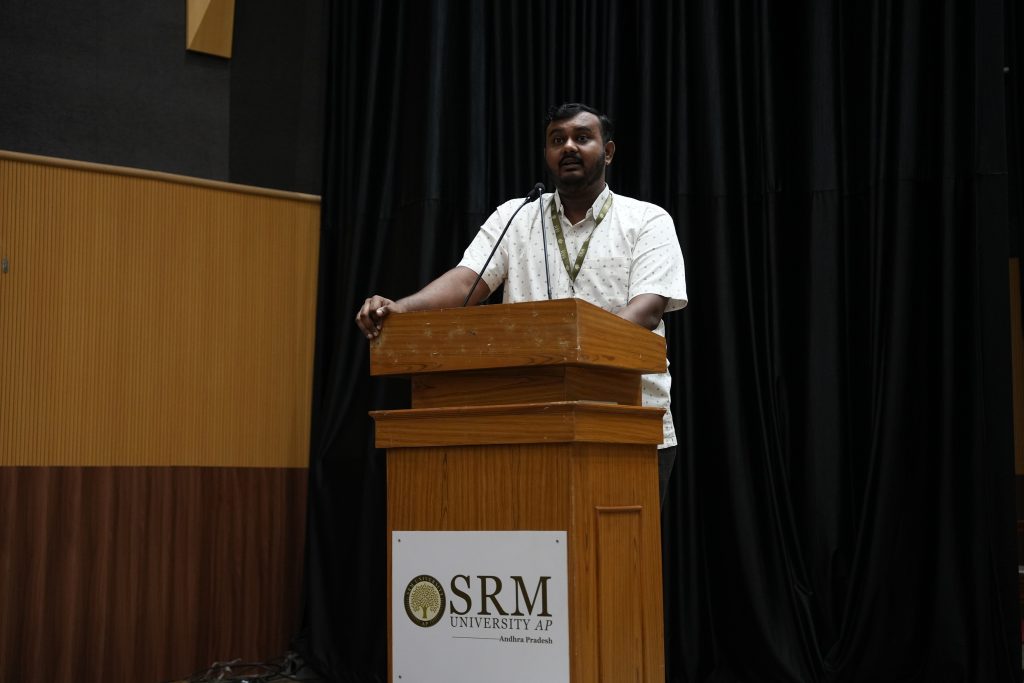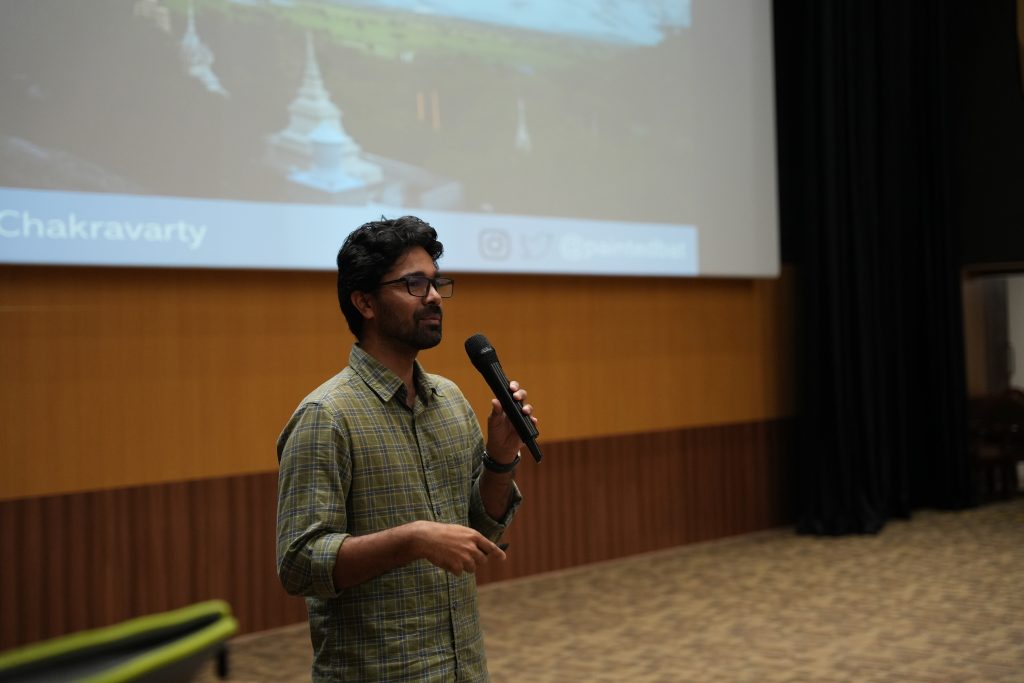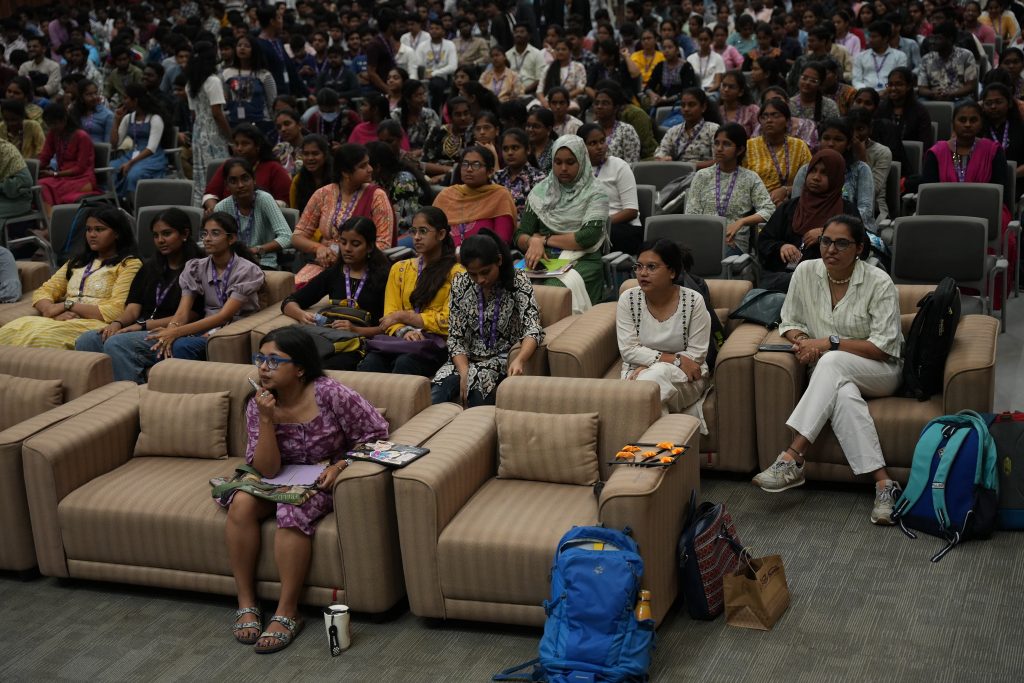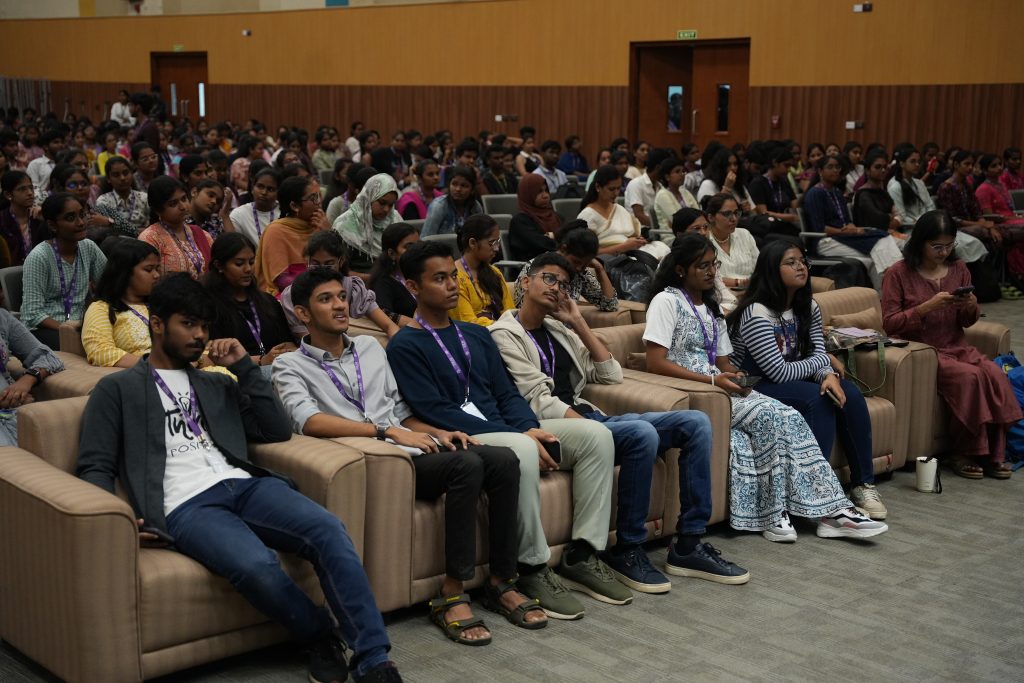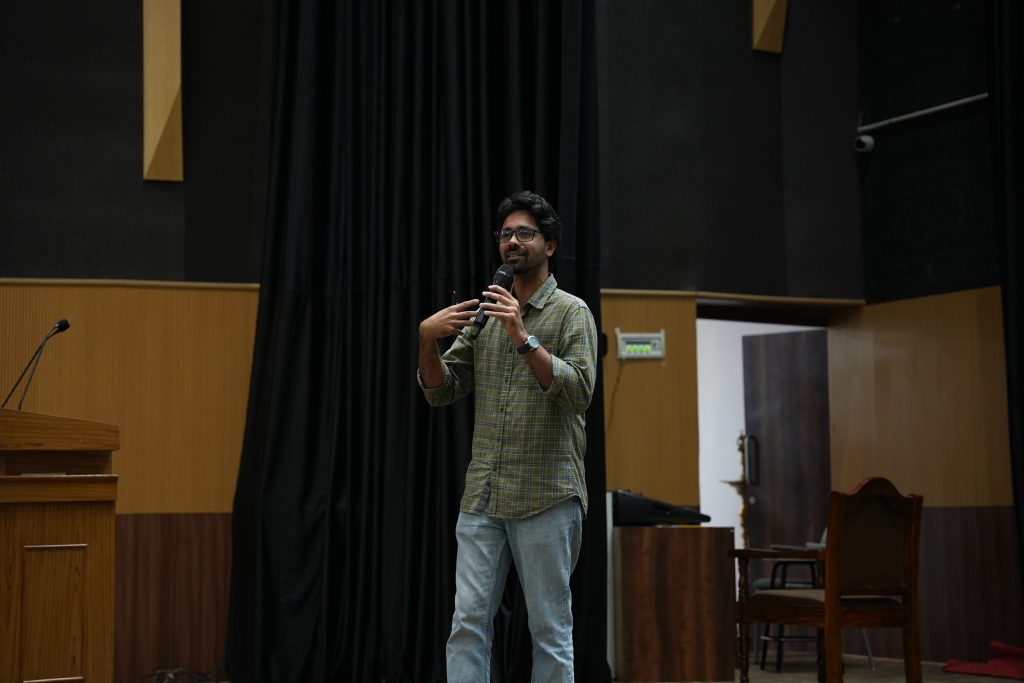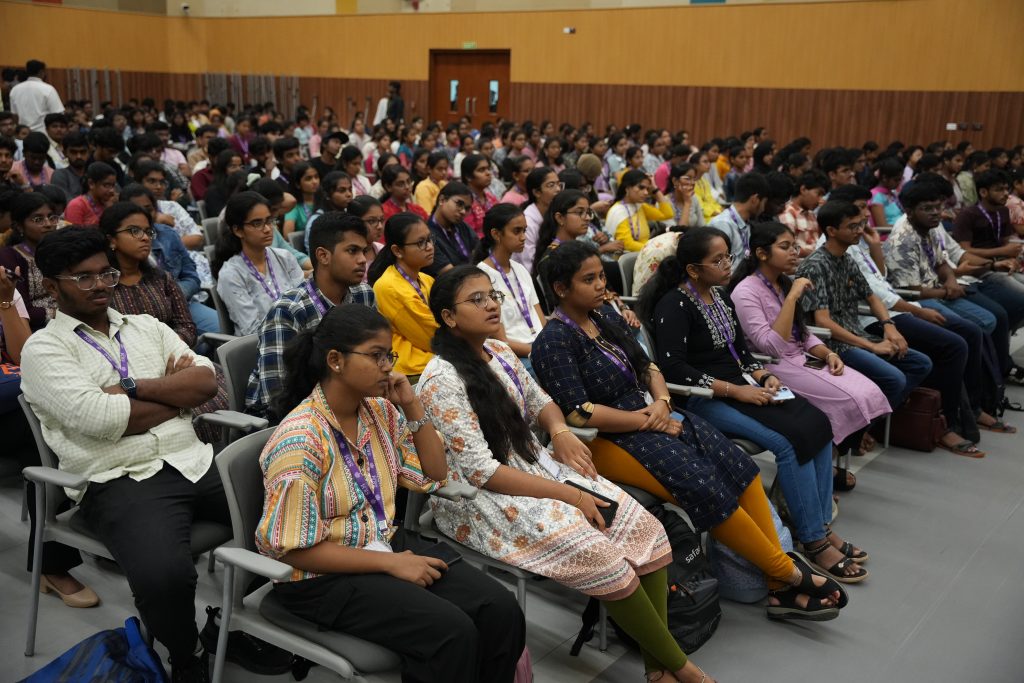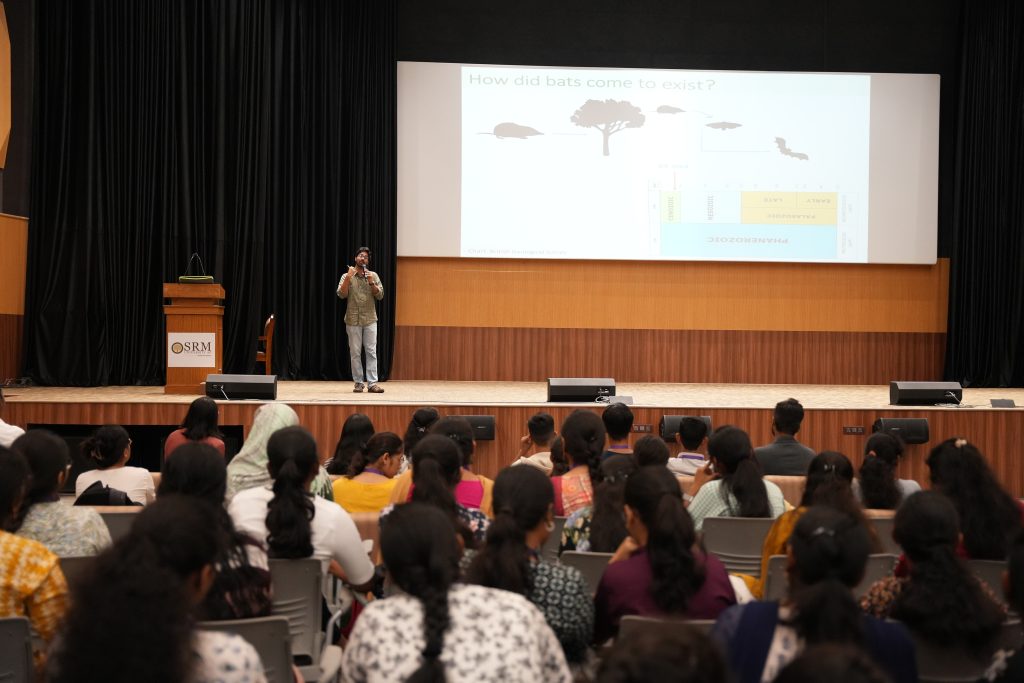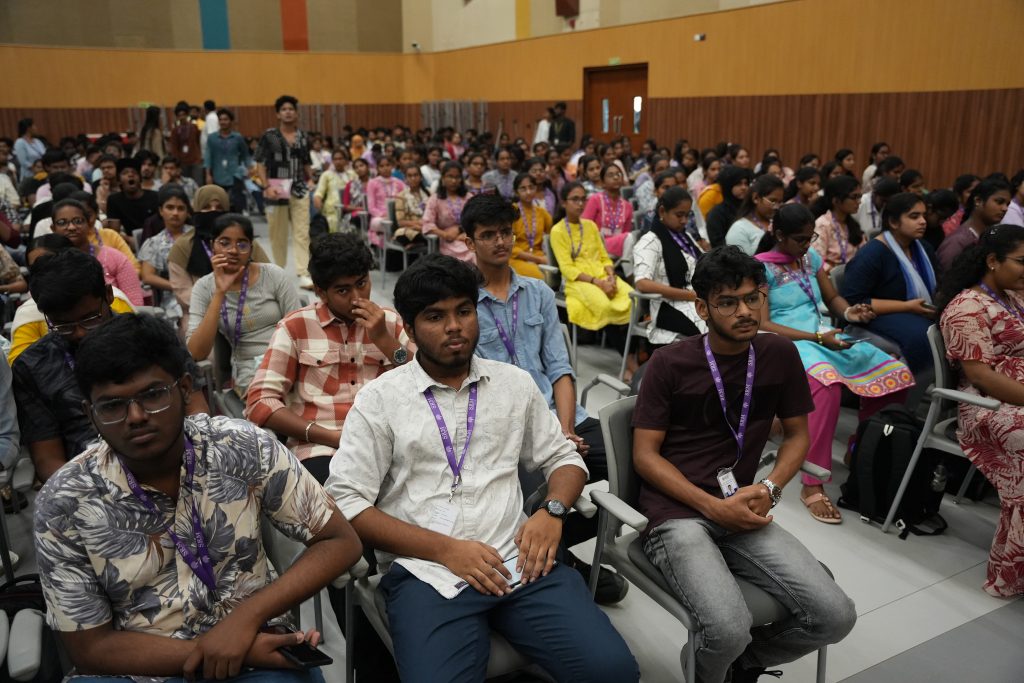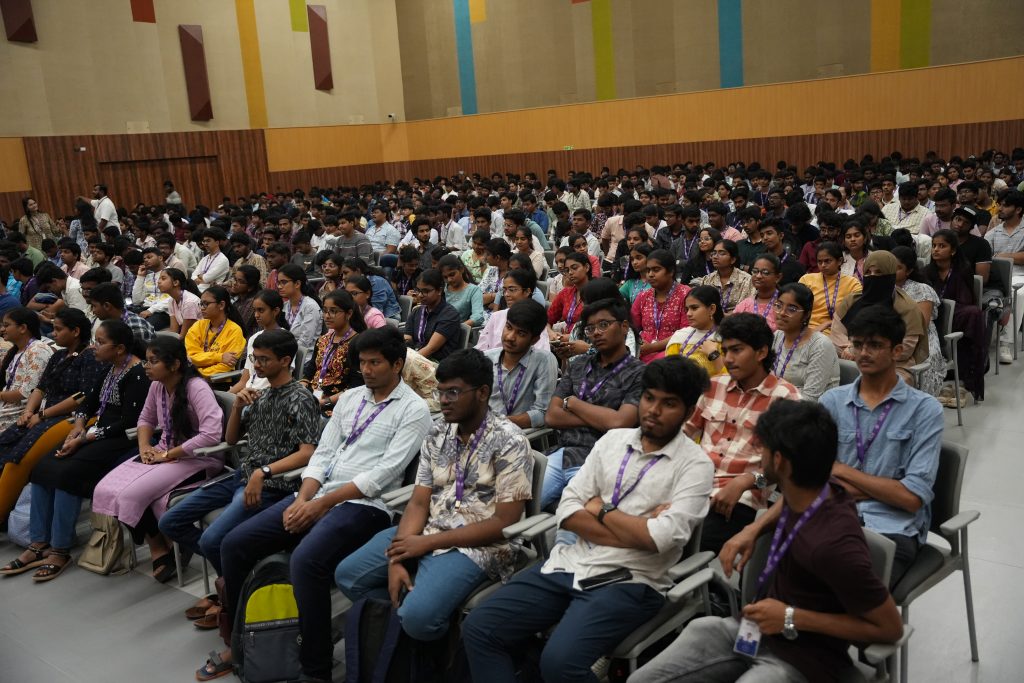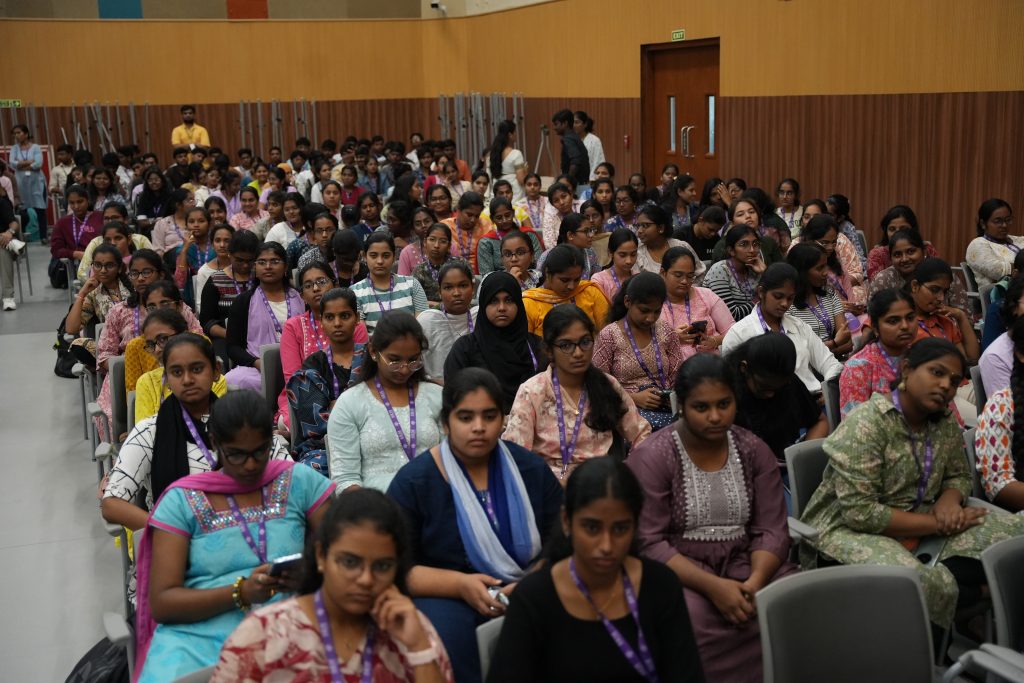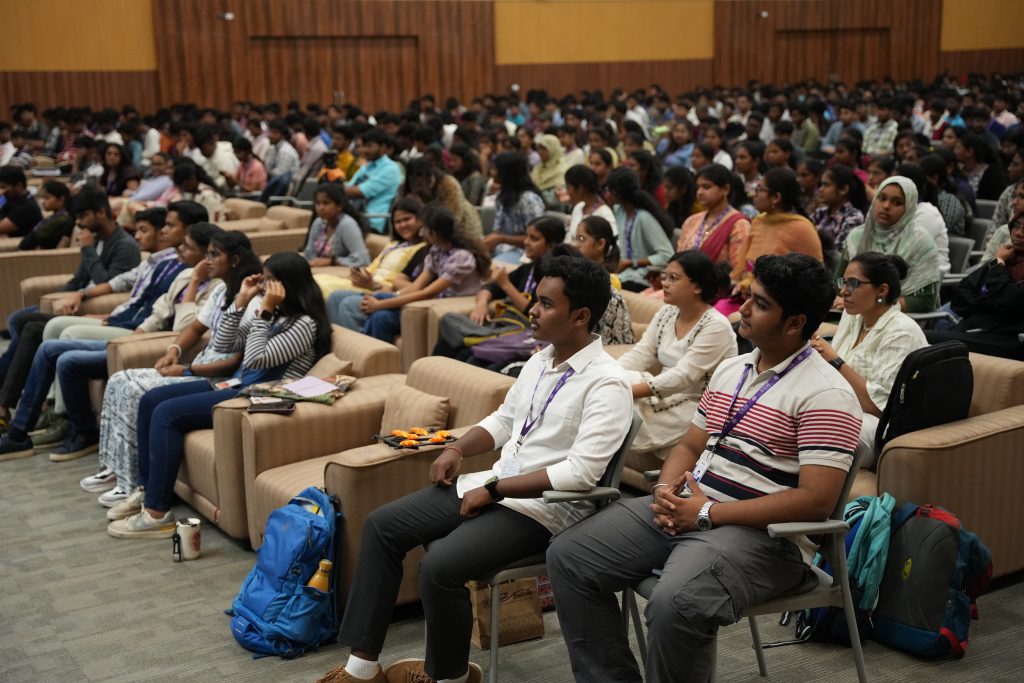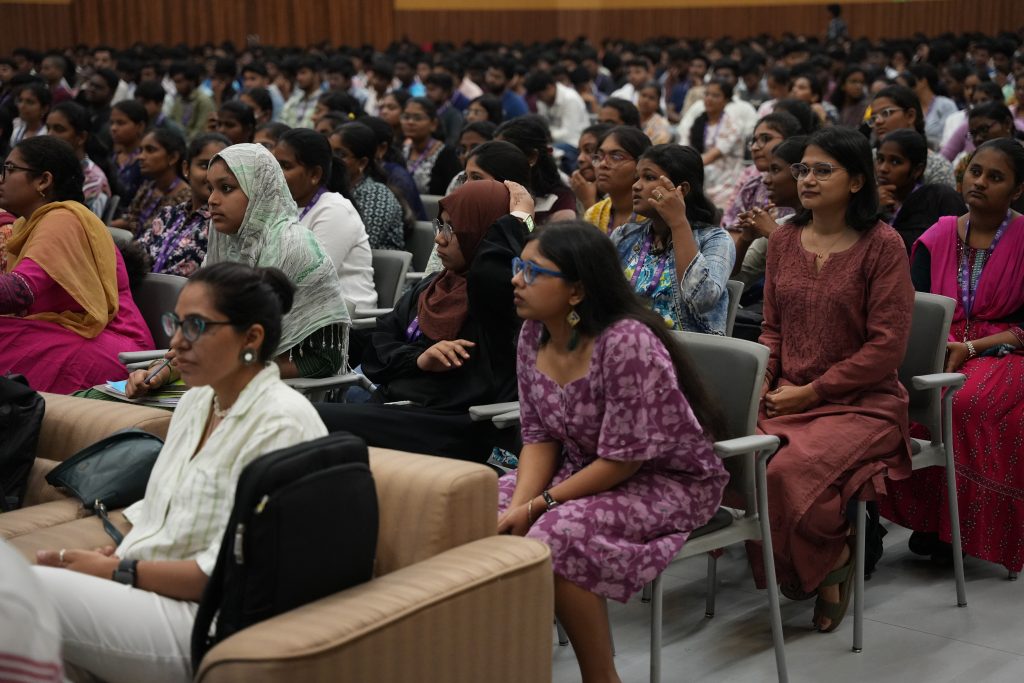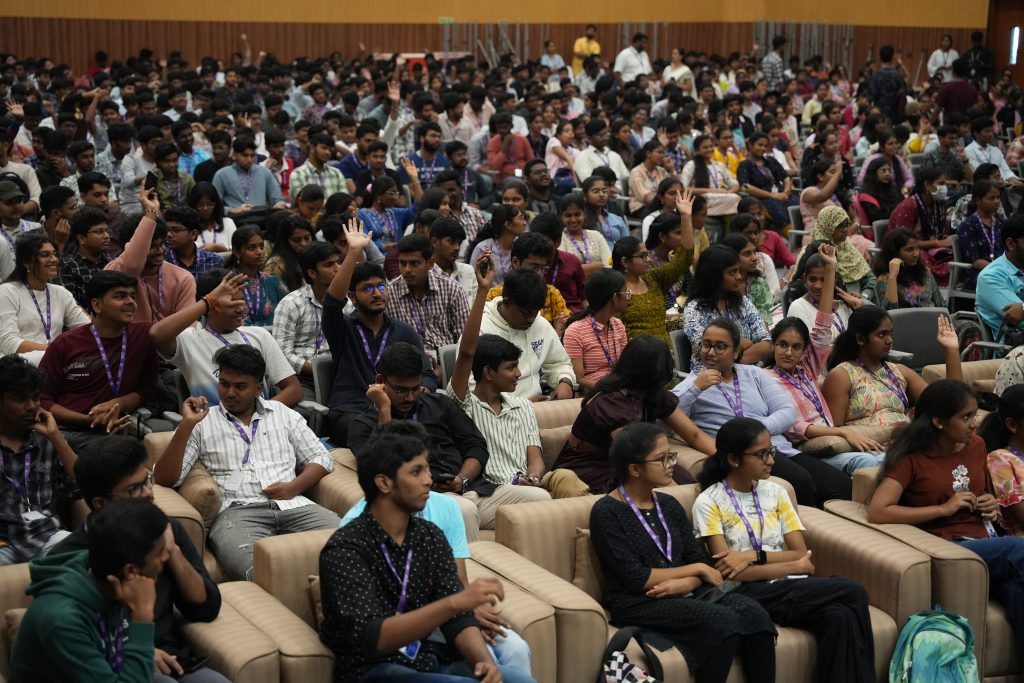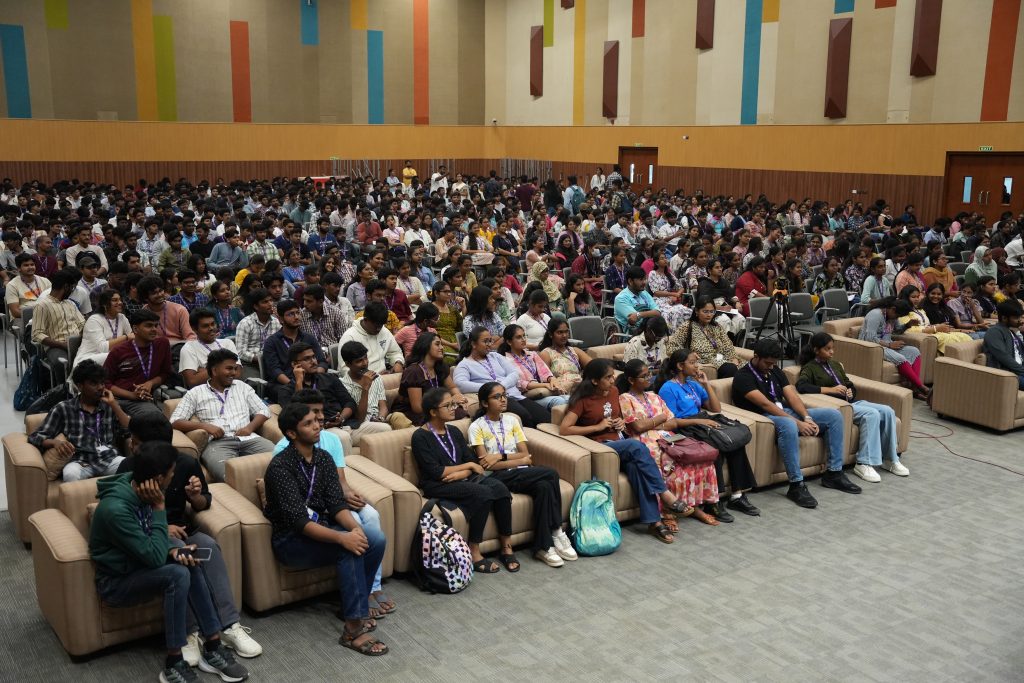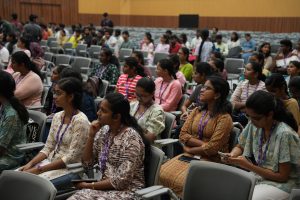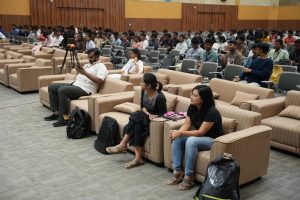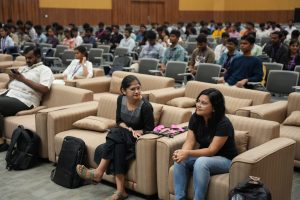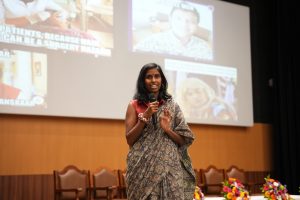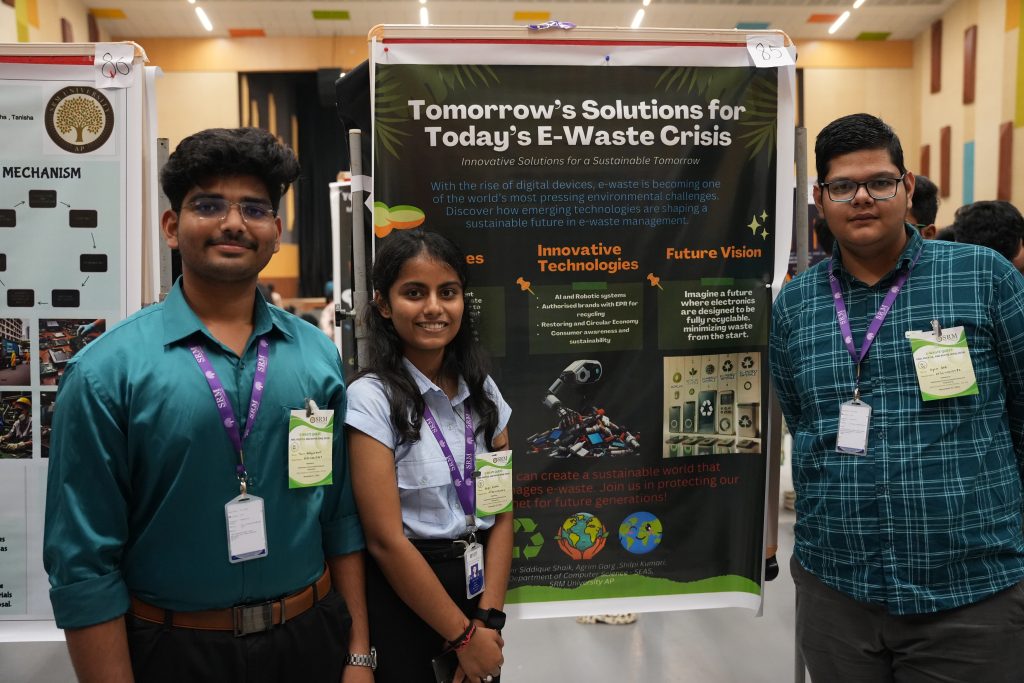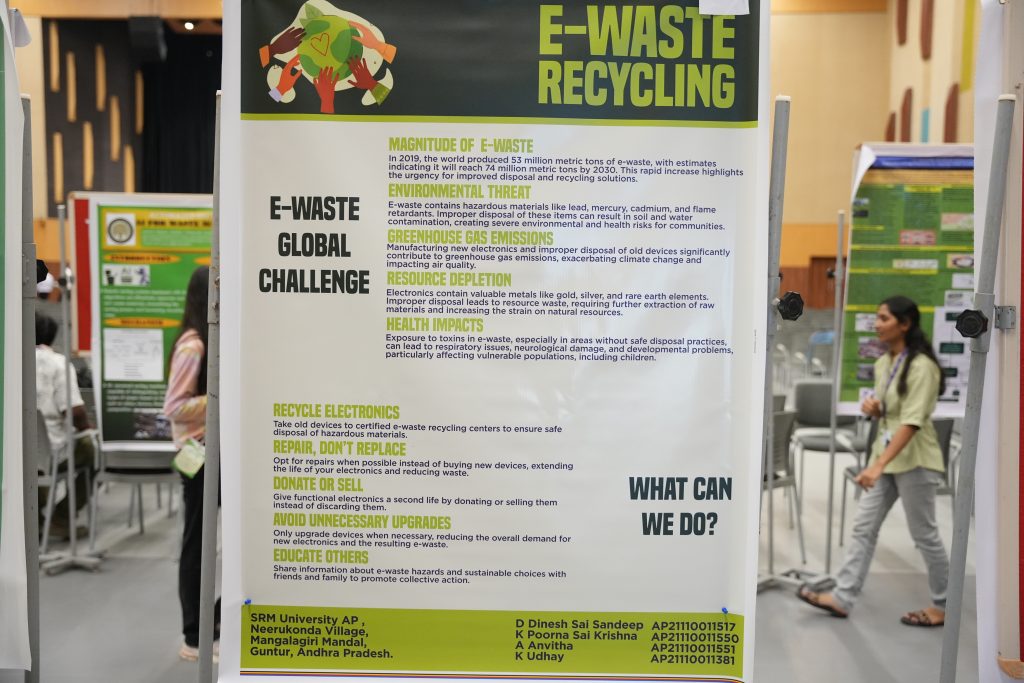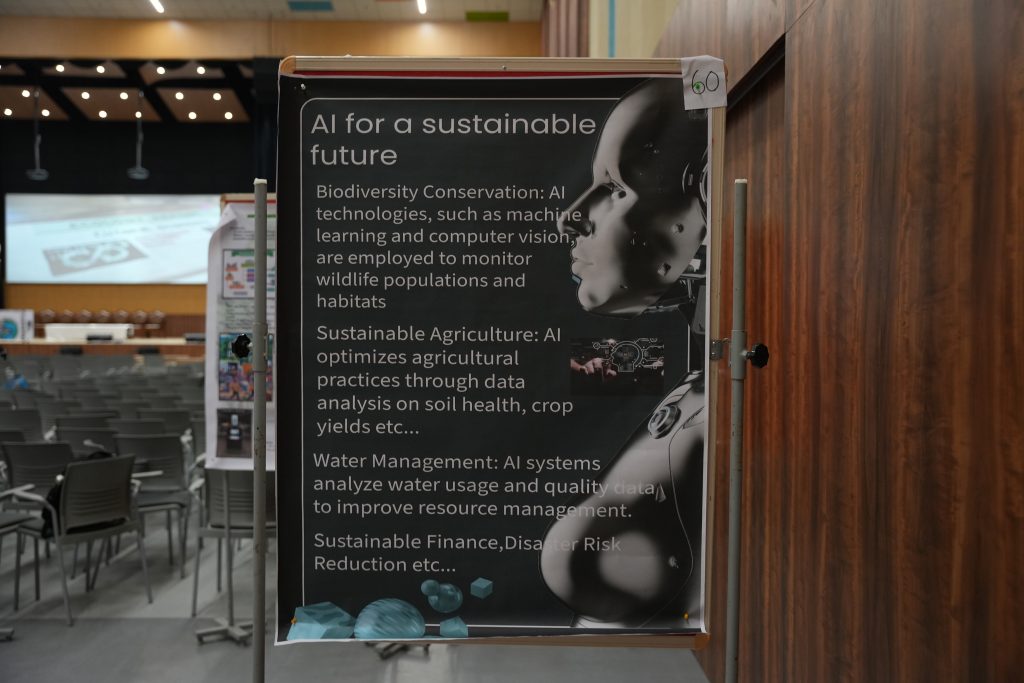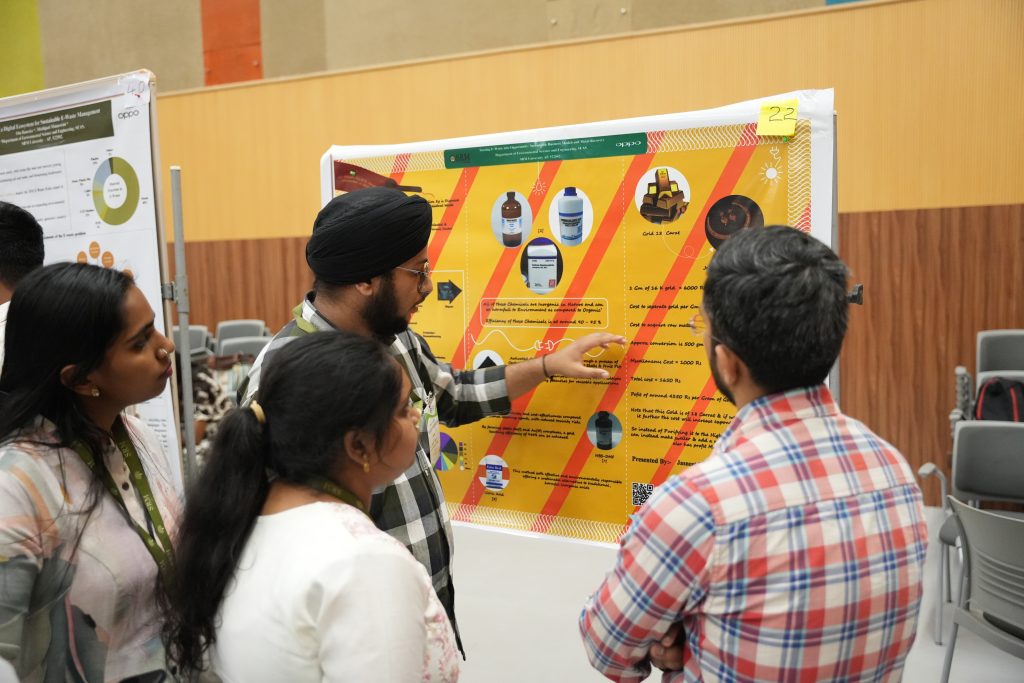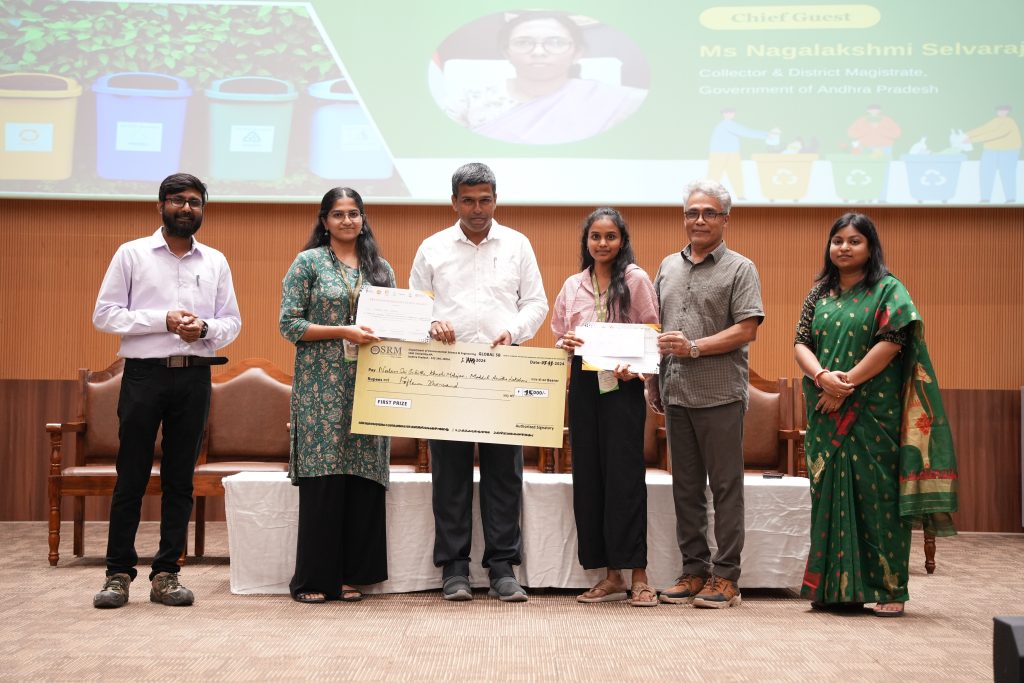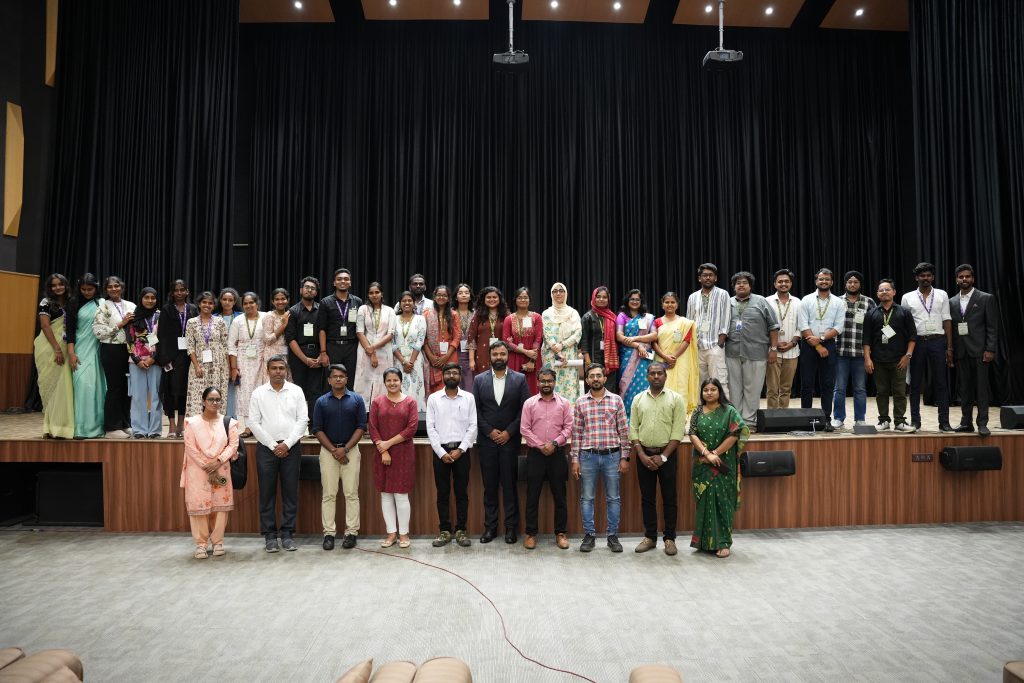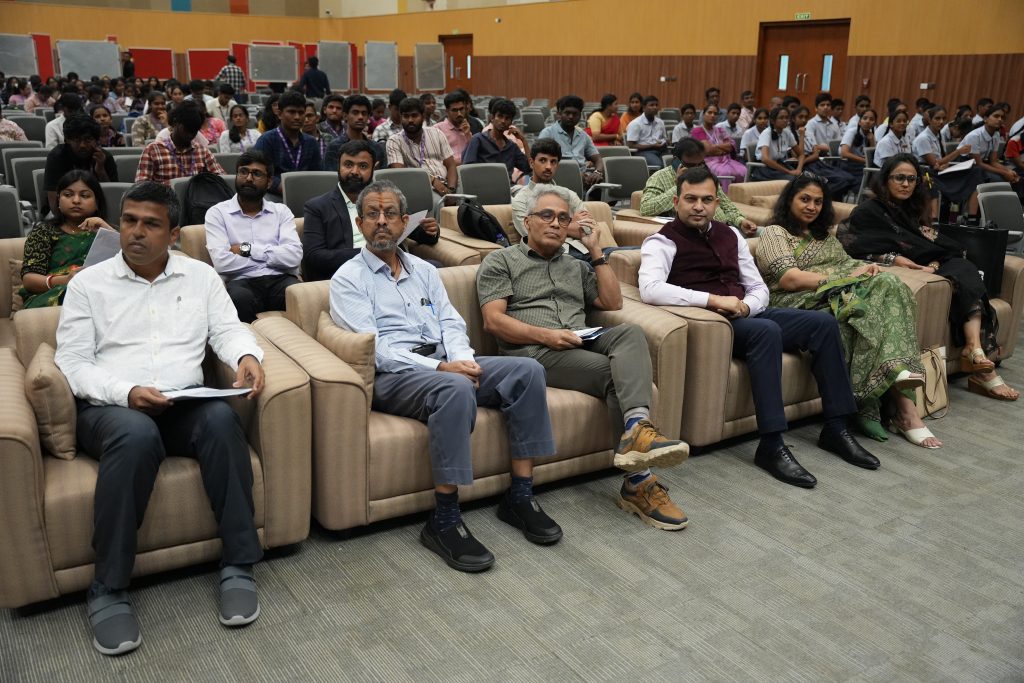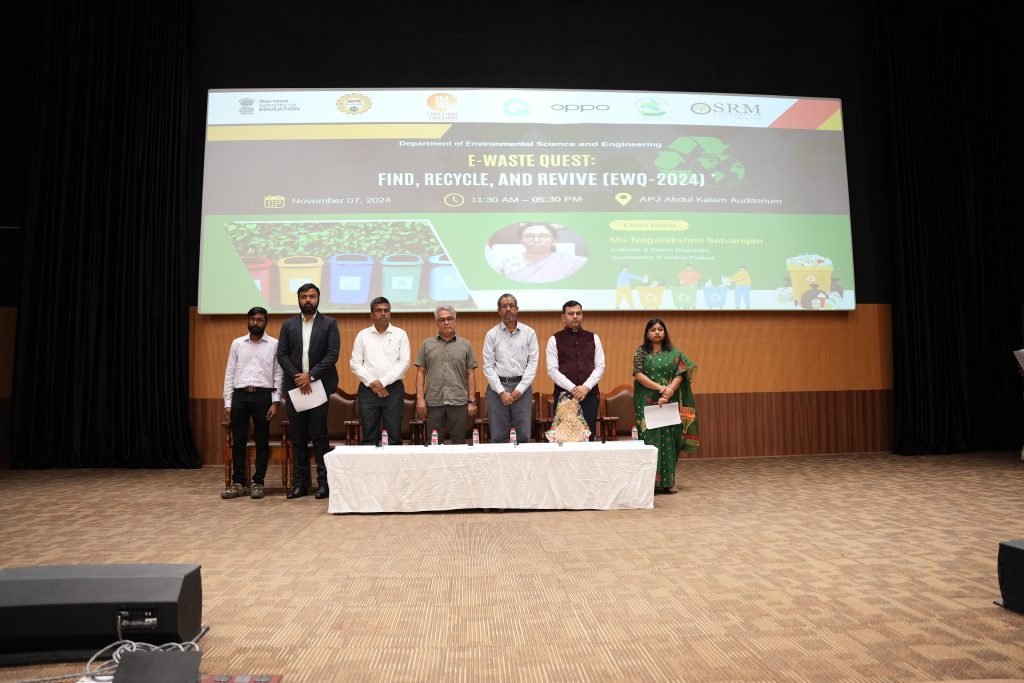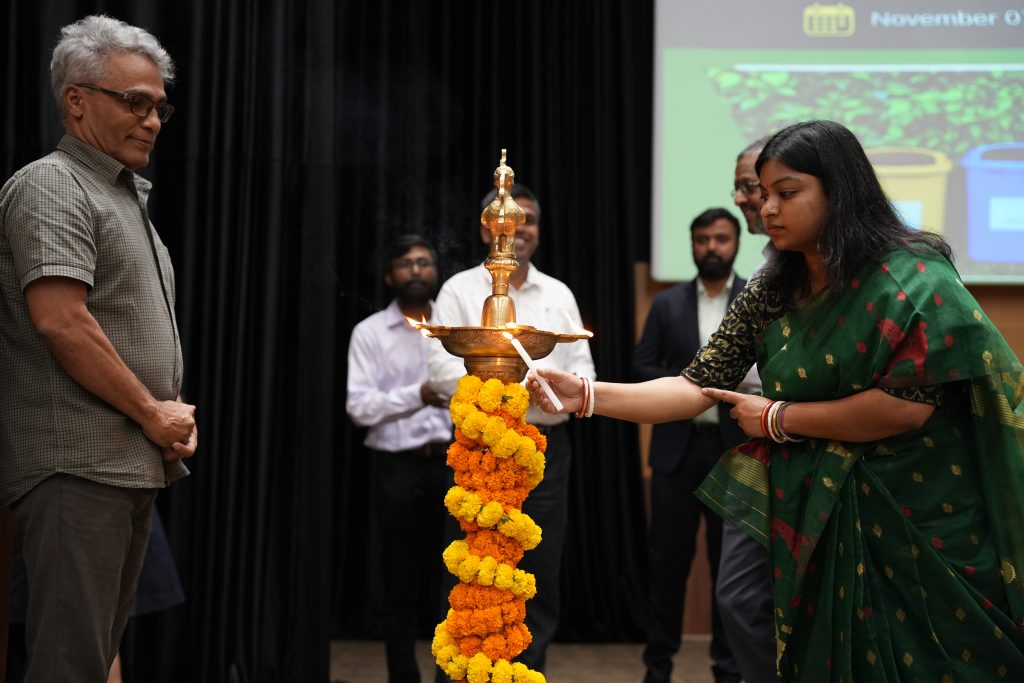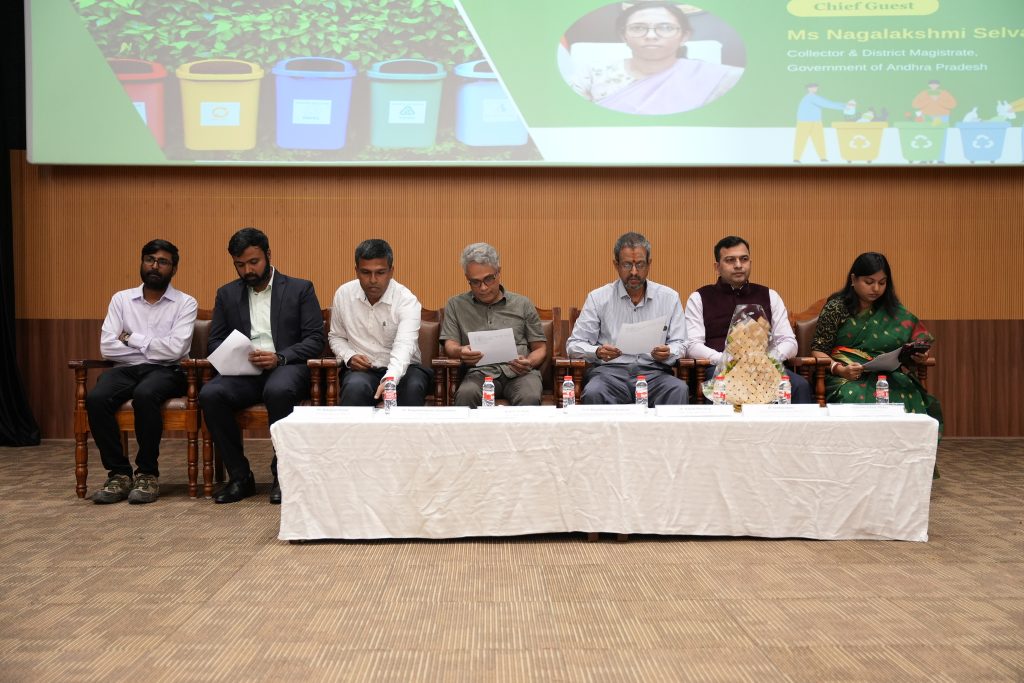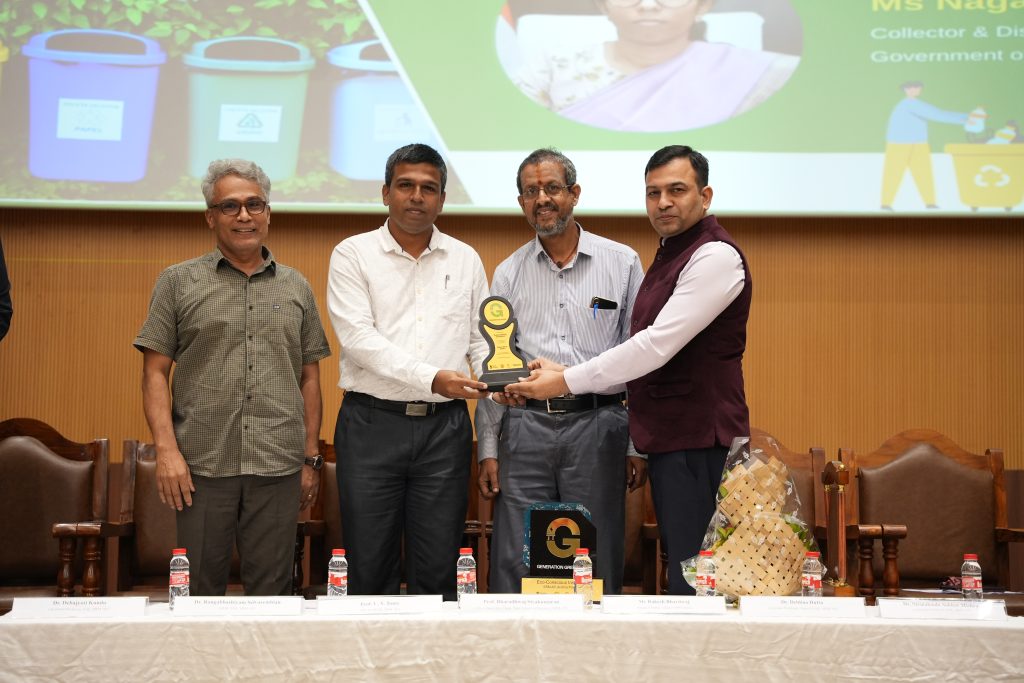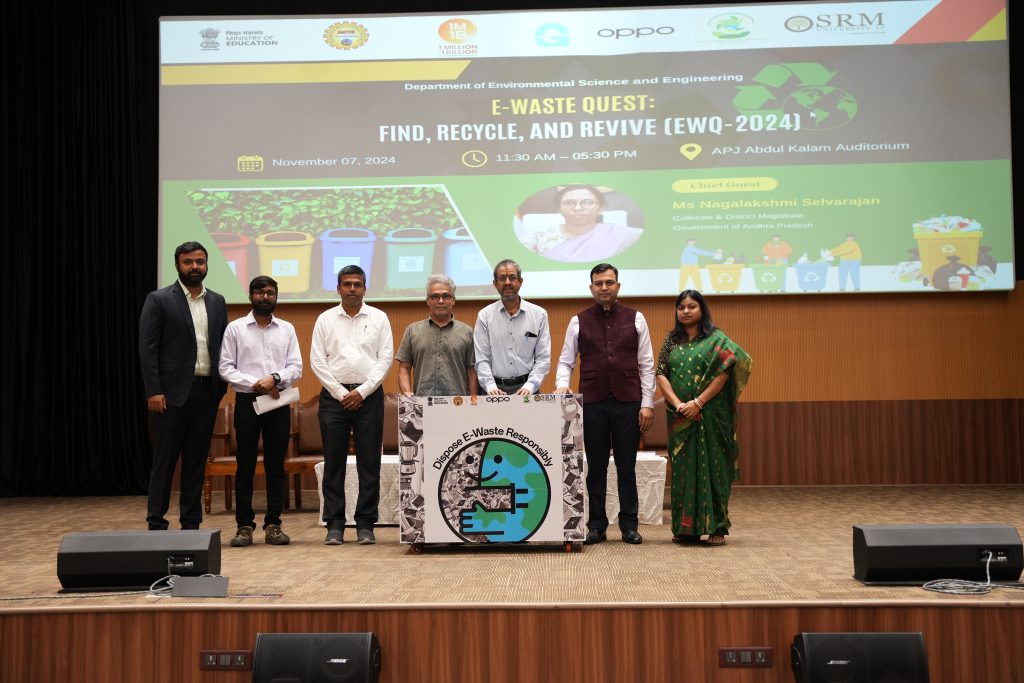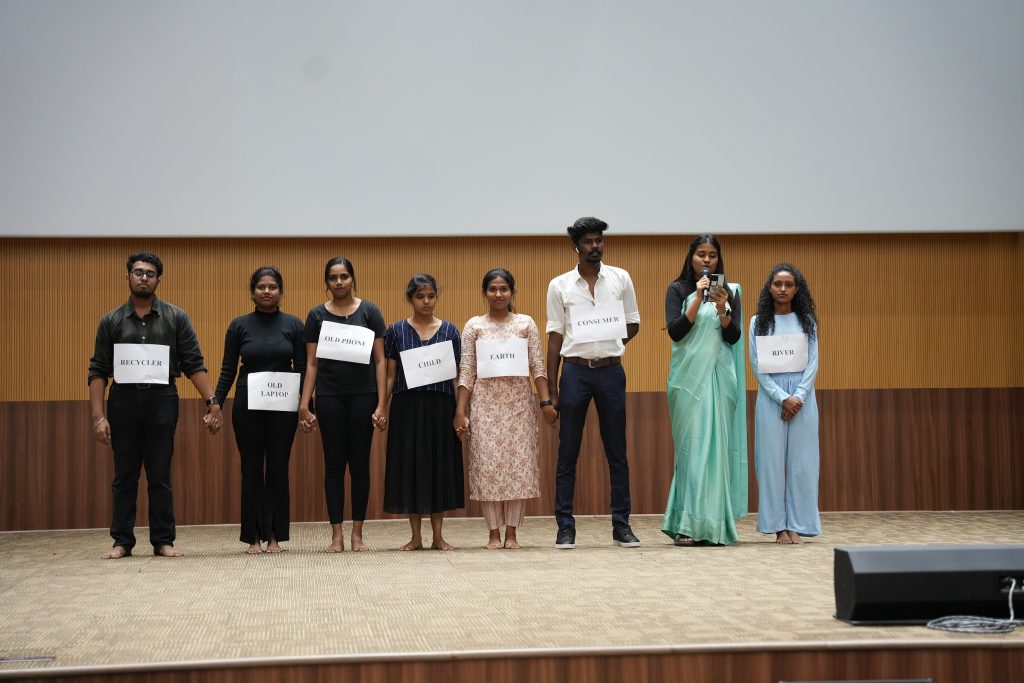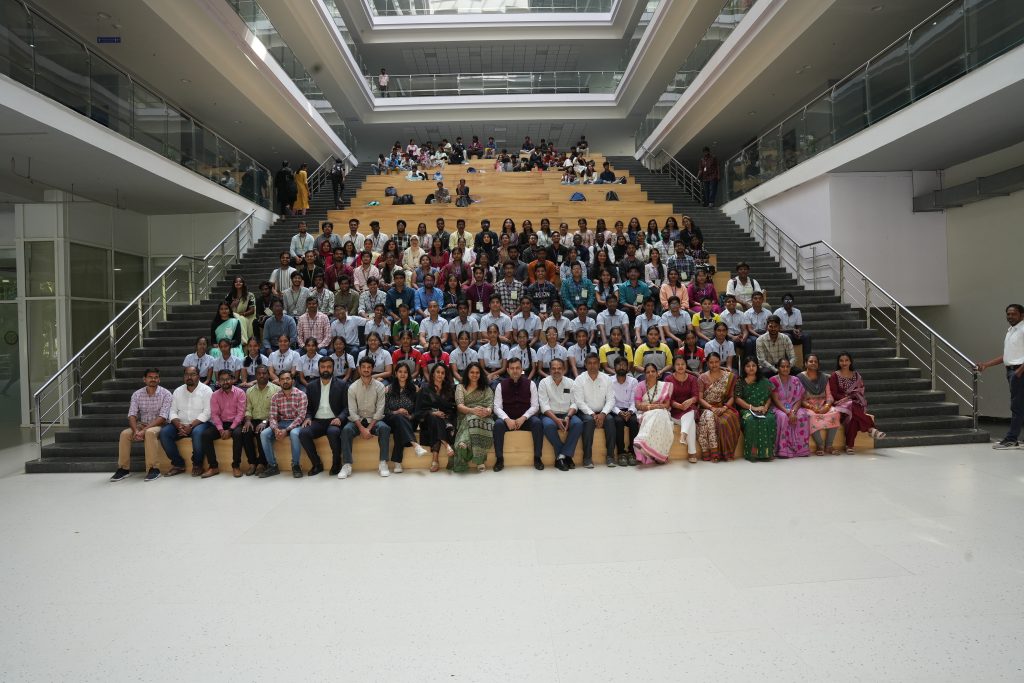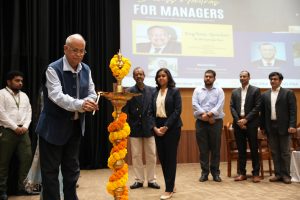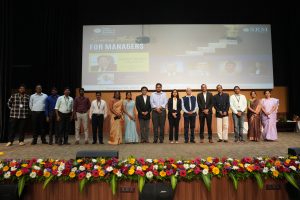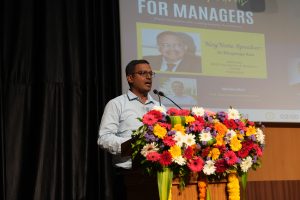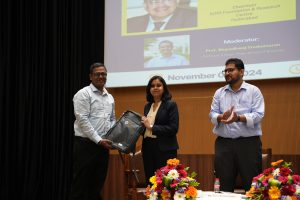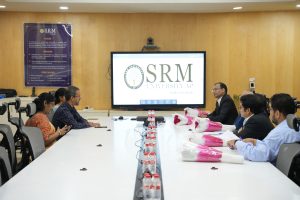Enhancing Atmospheric Water Harvesting for Sustainable Water Solutions
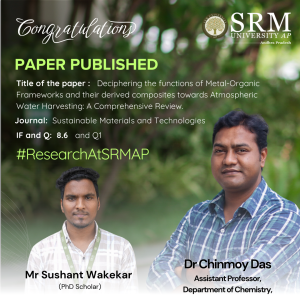 As water scarcity becomes an increasingly pressing issue, innovative solutions like atmospheric water harvesting (AWH) are being explored to provide sustainable access to fresh water. Dr Chinmoy Das, Assistant Professor from the Department of Chemistry and his research scholar Mr Sushant Wakekar have in their research paper titled, “Deciphering the functions of Metal-Organic Frameworks and their derived composites towards Atmospheric Water Harvesting: A comprehensive Review” analysed the crucial role of metal-organic frameworks (MOFs) and their composites in enhancing the efficiency of AWH systems.
As water scarcity becomes an increasingly pressing issue, innovative solutions like atmospheric water harvesting (AWH) are being explored to provide sustainable access to fresh water. Dr Chinmoy Das, Assistant Professor from the Department of Chemistry and his research scholar Mr Sushant Wakekar have in their research paper titled, “Deciphering the functions of Metal-Organic Frameworks and their derived composites towards Atmospheric Water Harvesting: A comprehensive Review” analysed the crucial role of metal-organic frameworks (MOFs) and their composites in enhancing the efficiency of AWH systems.
Abstract
To address water scarcity globally, recently atmospheric water harvesting (AWH) has emerged as an intriguing and sustainable solution. This comprehensive review critically investigates how diversity in metal-organic frameworks (MOFs) and their composite materials shapes the effectiveness and practicality of AWH technologies. These materials range from pristine MOFs to functionalized MOFs-based composites to attain the sophisticated hydrophilic behavior to perform as water harvesters. The multifaceted effects of MOFs and their composite materials on the kinetics of sorption and condensation, the feasibility of water uptake and release, the overall performance of the materials, the theoretical understanding of water uptake, and various instrumentation techniques have been demonstrated in this comprehensive review. It contributes to the ongoing discourse on sustainable water sourcing by emphasizing the pivotal role of materials diversity in shaping the future of AWH technologies.
Explanation of Research in layperson’s terms:
This review article explains how AWH technology, which captures water from the air, could provide sustainable solutions for water scarcity. We focus on advanced materials called MOFs and their ability to improve AWH efficiency. By analyzing different types of MOFs and MOF-based composites, we explore how they enhance water absorption and release, potentially making AWH more practical and effective for real-world use.
Practical/Social Implications of the Research:
This technology could have far-reaching social impacts by offering a reliable water source for communities in arid or remote areas, reducing reliance on traditional, often costly water sources, and strengthening resilience to climate change.
Future Research Plans:
To design and synthesis a material which can work with a minimum relative humidity (%RH) and design a suitable prototype for it.
Link to the Article
https://www.sciencedirect.com/science/article/pii/S2214993724003002

- Published in Chemistry-news, Departmental News, News, Research News
CSE Student Publishes in Q1 Journal on Breakthrough Research in Water Technology
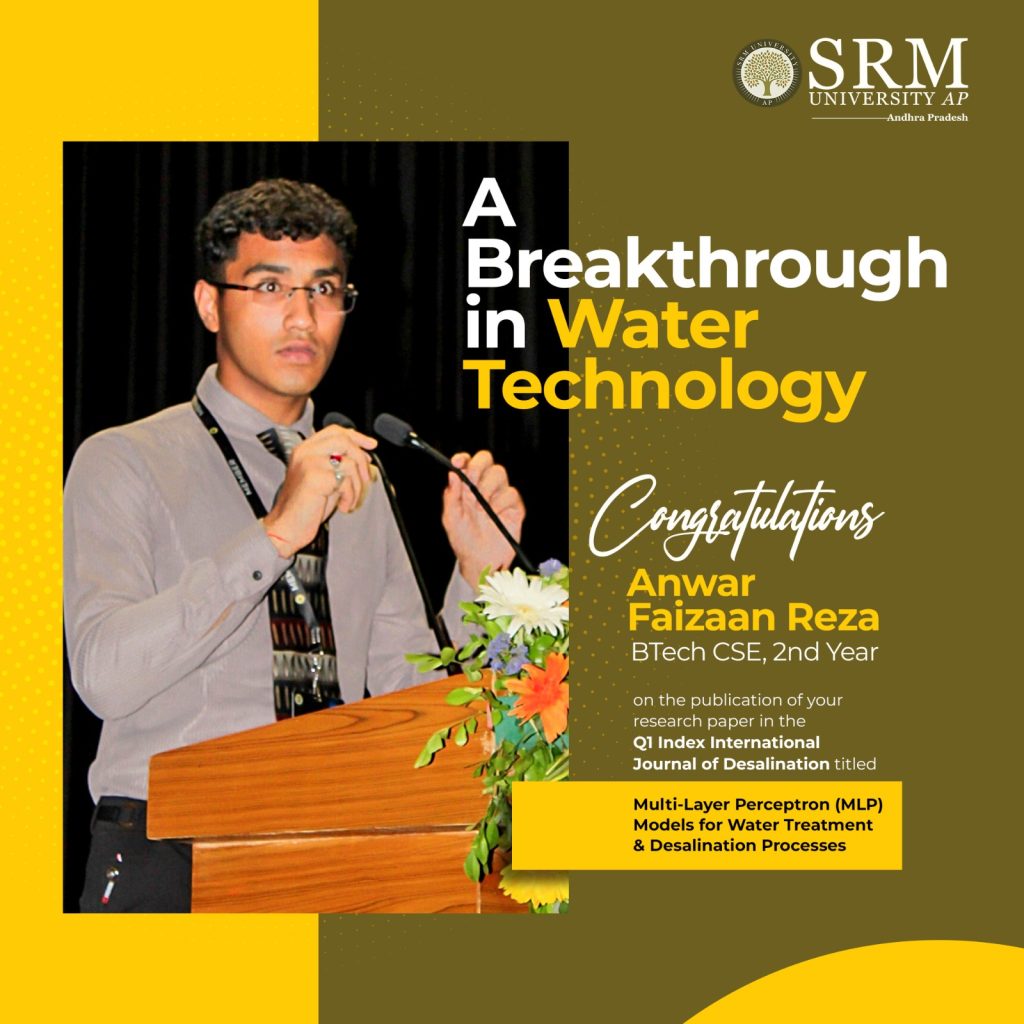
Exemplary student achievements in academia, research and industry are a testament to the excellence nurtured at the SRM University-AP. Mr Anwar Faizaan Reza, 2nd year B.Tech. student from the Department of Computer Science and Engineering has published his research paper in the prestigious Q1 journal Desalination. His paper titled “Multi-Layer Perceptron (MLP) Models for Water Treatment and Desalination Processes” provides a comprehensive review of Multi-Layer Perceptron (MLP) models as innovative tools in water treatment and desalination processes.
With the growing global water scarcity due to increasing population and urbanisation, the study emphasises the need for advanced technologies to optimise water management. Mr Reza discusses how MLPs, a type of artificial neural network, can effectively handle complex, non-linear data, making them suitable for predicting water quality and treatment efficiency.
The paper compares MLPs with traditional models, highlighting their advantages in adaptability and accuracy. It also addresses the limitations of MLPs, such as their dependence on high-quality training data and susceptibility to overfitting. Additionally, the research identifies existing gaps in the application of MLPs in real-world scenarios and suggests future opportunities for integration with other AI techniques and real-time data analysis.
In his paper, Mr Anwar Reza proposes that MLPs can significantly enhance decision-making in water treatment by providing accurate forecasts and optimizing operational processes. He also discusses the importance of developing user-friendly cost estimation tools for desalination projects and advocates for using MLPs in techno-economic assessments. Overall, the paper underscores the potential of MLPs to revolutionise water treatment and desalination, presenting them as vital components in addressing the challenges posed by water scarcity and quality management.
- Published in CSE NEWS, Departmental News, News, Students Achievements
A Session on Interspecies Living and Bio-acoustics by Rohit Chakravarty
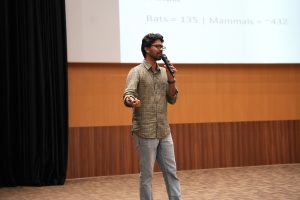
The Department of Sociology and Anthropology under the aegis of Easwari School of Liberal Arts at SRM University-AP hosted a thought-provoking session on November 07, 2024. The session unravelled a fascinating world of interspecies living and highlighted the vital yet often ignored role of bats in our ecosystem. Mr Rohit Chakravarthy, a bat researcher working with Nature Conservation Foundation and Bat Conservation International was the speaker for the session.
The session for the students of Universal Human Values and Ethics focused on inter species living and inclusivity, although misunderstood and feared, bats play a critical role in contributing to the agriculture and beverages industries. The session also revealed that bats are primary pollinators for Durian fruit and tequila, two products that owe their existence to these nocturnal creatures. The session witnessed many such interesting stories that helped to portray bats as less frightening creatures.
However, it wasn’t just science and industry on the agenda. The session brought to life the fascinating social structures within bat colonies and captivating stories of bats sharing food with those in need and even acting as midwives, assisting other bats during childbirth! These behaviours reflect values of care and community that humans can learn from—reminders of how interconnected life on Earth truly is!
The session also acknowledged their association with the deadly viruses such as SARS, COVID-19, and Nipah. As the session drew to a close, students walked away with more than just facts. They left with a renewed appreciation for the world around them.
The second session, directed at Open Elective students studying the Socio-Cultural Dimensions of Sound, dove into the incredible world of bio-acoustics. The lecture explored echolocation used by bats as an important indicator for the military infrastructure for improving sonar technology used in submarines. Students were fascinated by the intricacies of interspecies communication, as bats use sound not only for navigation but also to exchange crucial information about habitat, mating, and potential threats.
The lectures beautifully combined science, ethics, and socio-cultural insights, reflecting the Department’s mission to nurture holistic thinkers and foster interdisciplinary learning. Although unconventional, the talk seemed to open new and diverse avenues for Liberal arts students, inspiring them to walk newer and less trodden paths.
- Published in Departmental News, Liberal Arts News, News
A Strategic Partnership with Multi Commodity Exchange of India Ltd.
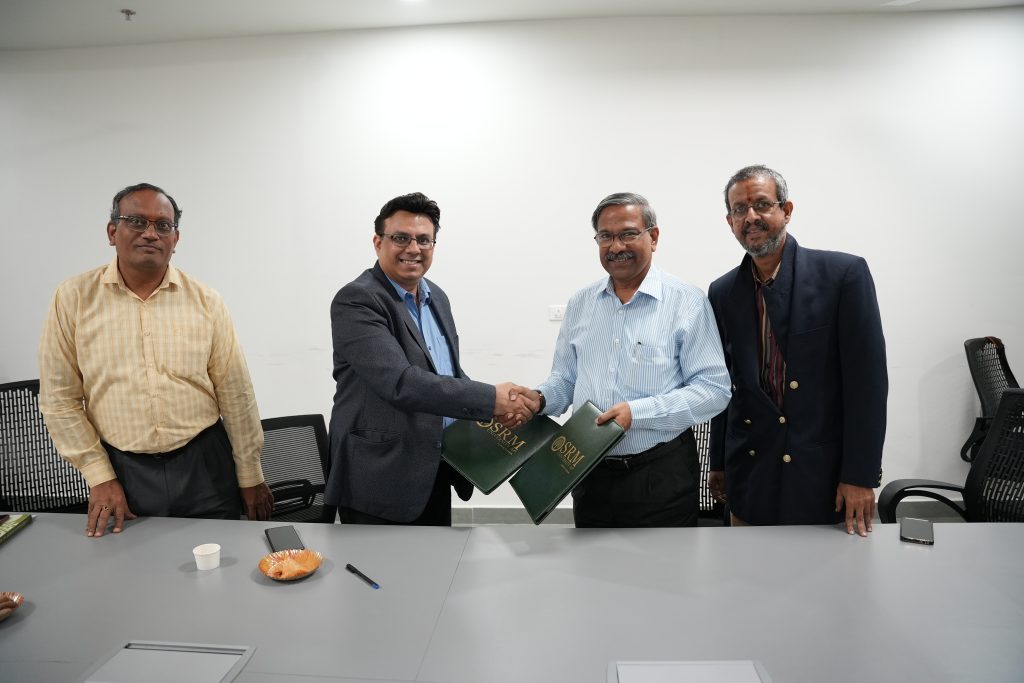
SRM University-AP inked an MoU with Multi Commodity Exchange of India Ltd. (MCX), the largest commodity exchange in the country, to supply highly skilled professionals to meet the industry’s needs. The commodity market plays a vital role in the country’s economic development. Understanding that the industry is expected to create a significant number of job opportunities in the next decade, the university has taken the initiative to partner with MCX to place highly competent graduates at various levels of the company.
The agreement will explore and conduct various interactive sessions, faculty development programmes, research programmes, seminars, conferences and conclaves that would benefit students, faculty and other working professionals. Joint Management Development Programmes (MDP) on the financial / derivatives market, educational conclaves on commodity derivatives inviting participation from other business schools & universities, and events like CONQUEST are some of the initiatives that the MOU manifests.
On the academic front, the MOU agrees that SRM University-AP may launch full/part-time Postgraduate Executive Diploma courses in the Financial /Commodity Derivatives Market with significant input from MCX on the curriculum. The university might also introduce a chapter on “Commodity Derivatives” in its curriculum for the management and commerce programmes. SRM AP will also offer existing courses of MCX, viz. MCX Commodity Professional (MCCP), MCX Certified Index Professional (MCIP) & MCX Certified Options Professional (MCOP) certification(s) as programmes or certification courses under the Paari School of Business.
The partnership with Multi Commodity Exchange of India Ltd. is of grave importance in providing the students and faculty with exposure to the industry, keeping pace with recent market trends, and acquiring an industry-ready skillset.
- Published in Departmental News, MoU, News, Paari Current Happenings
Challenging Norms and Expanding Perspectives with YSK Prerna
 In a world where conversations around gender are evolving rapidly, the Department of Sociology and Anthropology from the Easwari School of Liberal Arts at SRM University-AP hosted a two-part lecture series that sparked introspection, challenged societal norms, and helped foster inclusivity. With honest discussions, cultural references, and meaningful reflections, the sessions resonated deeply with students, encouraging them to rethink what they know about gender.The session saw Artistic Director of Conflictorium – Museum of Conflict, Chattisgarh, and Gujarat, YSK Prerana as its speaker.
In a world where conversations around gender are evolving rapidly, the Department of Sociology and Anthropology from the Easwari School of Liberal Arts at SRM University-AP hosted a two-part lecture series that sparked introspection, challenged societal norms, and helped foster inclusivity. With honest discussions, cultural references, and meaningful reflections, the sessions resonated deeply with students, encouraging them to rethink what they know about gender.The session saw Artistic Director of Conflictorium – Museum of Conflict, Chattisgarh, and Gujarat, YSK Prerana as its speaker.
The first session for the Universal Human Values and Ethics students opened the door to reimagining gender beyond traditional binaries. The discussions tackled pressing issues such as inequality, the choice of motherhood, and the issue of gender-based violence. The session wove in popular memes that students see every day to explore how gender stereotypes are subtly reinforced. The speaker took things a step further, the short film Juice. Set in a household gathering, the movie painted a raw picture of how caste, class, and gender intersect, powerfully illustrating how invisible power dynamics shape everyday interactions.
The session wasn’t about pointing fingers or placing blame. It was about understanding—about seeing the world through a different lens and recognising how ingrained norms can shape perceptions. Students left the room not just with questions but with a drive to seek answers and advocate for change.
The second session, tailored for students of the Open Elective Law and Society, turned the focus inward. It started with a simple question: When did you first become aware of your gender? What followed was an exploration of how gender is more than an identity—it’s a social construct shaped by power dynamics.
Students examined how societal categories like caste and class blend into gendered expectations and how these norms are portrayed through media. But the session didn’t just focus on challenges. It celebrated progress, stressing upon how new meanings and ways of expressing gender are emerging every day.
The sessions made students pause and think about the roles they play in their communities and the changes they can bring. By addressing deeply ingrained issues with honesty and compassion, the Department of Sociology and Anthropology created a space where students could reflect on their own experiences, listen and most importantly ask questions.
- Published in Departmental News, News, Sociology and Anthropology News
Innovating the Art of Teaching Through Gamification & Game-Based Learning (GBL)
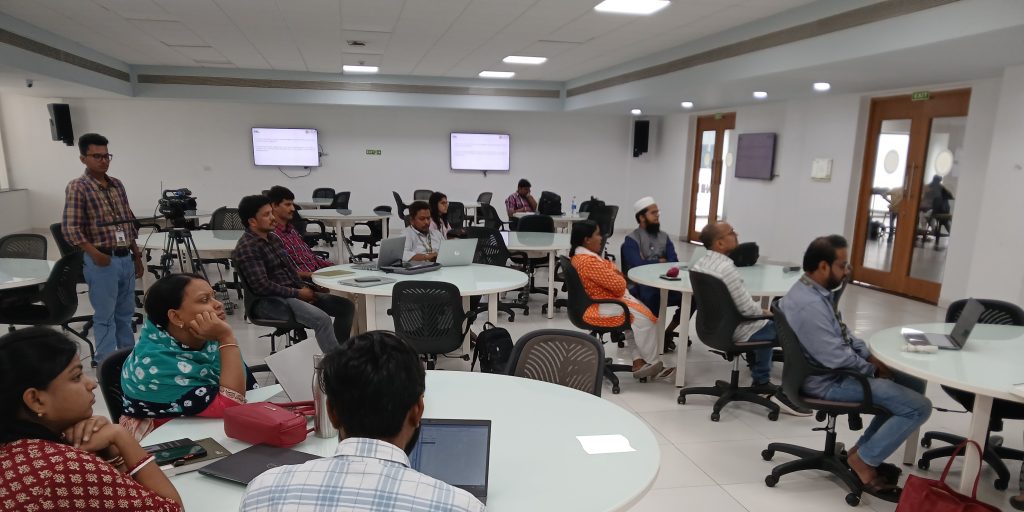
In alignment with the university’s goal to enhance academic excellence, innovation in teaching-learning methods that transgress from non-traditional approaches has taken pivotal importance in academia. To facilitate enhanced and experiential learning experiences for students, the Teaching Learning Centre organised a workshop on “Gamification and Game-based Learning (GBL) in University Education” on November 13, 2024, led by Dr Sunil Chinnadurai, Assistant Professor, Department of Electronics and Communication Engineering. The workshop explored the benefits, challenges, and practical strategies for incorporating Gamification and GBL methods in university-level courses.
The session opened with a discussion on the difference between gamification and game-based learning, two concepts that share similar principles but serve different functions. Gamification, Dr Chinnadurai explained, involves including game-like elements, such as points, badges, and reward systems, in traditional classroom activities. Using these, instructors can transform routine tasks into interactive, motivational experiences for students. Game-based learning, however, takes the concept further by using games as teaching tools. Through this method, students learn by actively engaging in activities that relate to the course matter.
Throughout the workshop, instructors explored how these methods could significantly benefit students. Gamification and GBL have been shown to increase student engagement and actively involve them in learning. This method promotes knowledge skills, boosts creativity, strengthens problem-solving skills, and encourages active participation in the classroom.
The workshop also discussed the practical challenges instructors might face when incorporating GBL and gamification into their courses. Technical issues, student resistance to non-traditional learning methods, and the additional time required for planning were highlighted as common problems. Dr Chinnadurai emphasised the importance of aligning game-based activities with course objectives. Clear rules, along with timely feedback, are essential for creating effective and engaging learning experiences that also meet academic standards.
To provide participants with hands-on experience, the workshop introduced interactive tools such as Kahoot! and Mentimeter, which act as platforms for creating quizzes, polls, and other gamified content. These tools also introduced us to the potential of scenario-based learning.
The workshop highlighted the value of adopting new teaching methodologies in academic pedagogies. As instructors look to enhance their students’ learning experiences, gamification and game-based learning provide promising avenues for making education both rigorous and enjoyable.
- Published in Departmental News, News, Teaching Learning Centre, Workshop
Navigating the Startup Landscape
A Tech Talk was jointly organised by the Paari School of Business and the Directorate of CR & CS. It gave budding entrepreneurs of SRM AP a comprehensive view of building and scaling startups, with practical guidance on MVP development, funding paths, and team expansion through structured hiring practices.
The Talk featuring Aravind Subash, Lead – Talent Acquisition at Increff, as the guest speaker, included engaging exercises such as conducting Extensive Research on Bootstrap Companies in India and Designing a Recruitment Flowchart, which helped students understand the various nuances of being an entrepreneur.
Mr Aravind also shared inputs on investment strategies, highlighting contributions from notable investors such as Kunal Shah (founder of CRED) and Binny Bansal (co-founder of Flipkart).
The insights shared were valuable for young students looking to start, scale, or fund a business in the dynamic startup ecosystem.
- Published in Departmental News, News, Paari Current Happenings
SRM AP Joins OPPO India in its Clarion Call against E-Waste
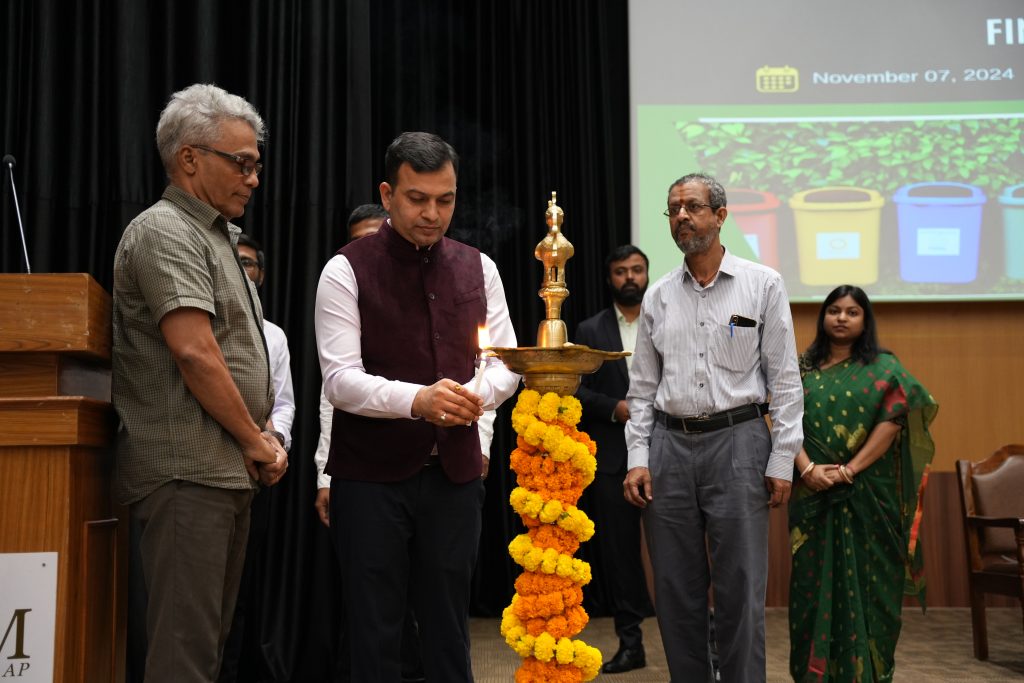 SRM University-AP, in collaboration with OPPO India and the All-India Council for Technical Education (AICTE), is partnering to support “Generation Green”—a national-level initiative aimed at empowering youth to become advocates of sustainability through green skills and actionable commitments. The first phase of the campaign saw AICTE and OPPO India partner with 1M1B to promote sustainable practices among youth by offering green internships to students across India. Launched on July 08, 2024, by AICTE Chairman Prof. T G Sitharam, in the presence of Dr Buddha Chandrasekhar, CCO, AICTE, over 9,000 students from more than 1,400 institutions applied to join the noble venture.
SRM University-AP, in collaboration with OPPO India and the All-India Council for Technical Education (AICTE), is partnering to support “Generation Green”—a national-level initiative aimed at empowering youth to become advocates of sustainability through green skills and actionable commitments. The first phase of the campaign saw AICTE and OPPO India partner with 1M1B to promote sustainable practices among youth by offering green internships to students across India. Launched on July 08, 2024, by AICTE Chairman Prof. T G Sitharam, in the presence of Dr Buddha Chandrasekhar, CCO, AICTE, over 9,000 students from more than 1,400 institutions applied to join the noble venture.
The second phase of the ‘Generation Green’ campaign witnessed SRM AP’s partnership with OPPO and AICTE for educating youngsters about the need for responsible electronic waste management. In alignment with this initiative, the varsity conducted E-Waste Quest 2024, wherein it enlightened students on the issue of waste management of discarded electronic items such as mobile phones, chargers, batteries, and wires. With over 400,000 pledges to date, the campaign now targets one million youth engagements by the end of 2024 to create a lasting impact on e-waste management and environmental preservation. On the occasion OPPO India awarded the SRM University with the title of Eco-Conscious Institution, reflecting the varsity’s commitment to sustainability.
Pro-Chancellor Dr P Sathyanarayanan and Vice Chancellor Prof. Manoj K Arora congratulated the Department of Environmental Science and Engineering for their dedication and commitment to this cause, while Prof. Bharadhwaj Sivakumaran, Dean-Paari School of Business and the officiating Vice Chancellor, emphasised, “Initiatives like the Generation Green Campaign illustrate how small, purposeful actions can catalyse significant change toward a sustainable future.”
Prof. C V Tomy, Dean of the School of Engineering and Sciences, addressed the gathering with an inspiring call to action, stating that every school must have an e-waste collection centre. He stated, “This effort not only promotes responsible disposal but also opens doors to entrepreneurial opportunities, instilling a mindset of sustainability and innovation among students.”
During the launch of the E-Waste Quest 2024, Mr Rakesh Bhardwaj from OPPO India stated, “Today marks a pivotal moment in our collective commitment to a sustainable future. This initiative encourages our youth to take ownership of their role in environmental stewardship.” Dr Rangabhashiyam Selvasembian, Associate Professor and Head-Department of Environmental Science and Engineering, stated, “A motivated and informed generation has the power to reshape our planet. If we do not take responsibility for its protection, no one else will.”
Dr Vinayak Kalluri, Dean-Academic Affairs, implored the youth to fight together in this crusade to save Mother Nature from the horrors of e-waste, noting, “The transition for a sustainable future arises from engaging in small acts of sustainability that result in big transformations.” Additionally, Collector and District Magistrate, Ms Nagalakshmi Selvarajan shared a meaningful message on the importance of community involvement. The E-Waste Quest 2024 served as a powerful reminder that collective efforts help shape a greener future where progress and sustainability go hand in hand.
- Published in Departmental News, ENVS News, News
Understanding the Impact of Sundarbans Mangroves on Global Oceanic Carbon Budgets
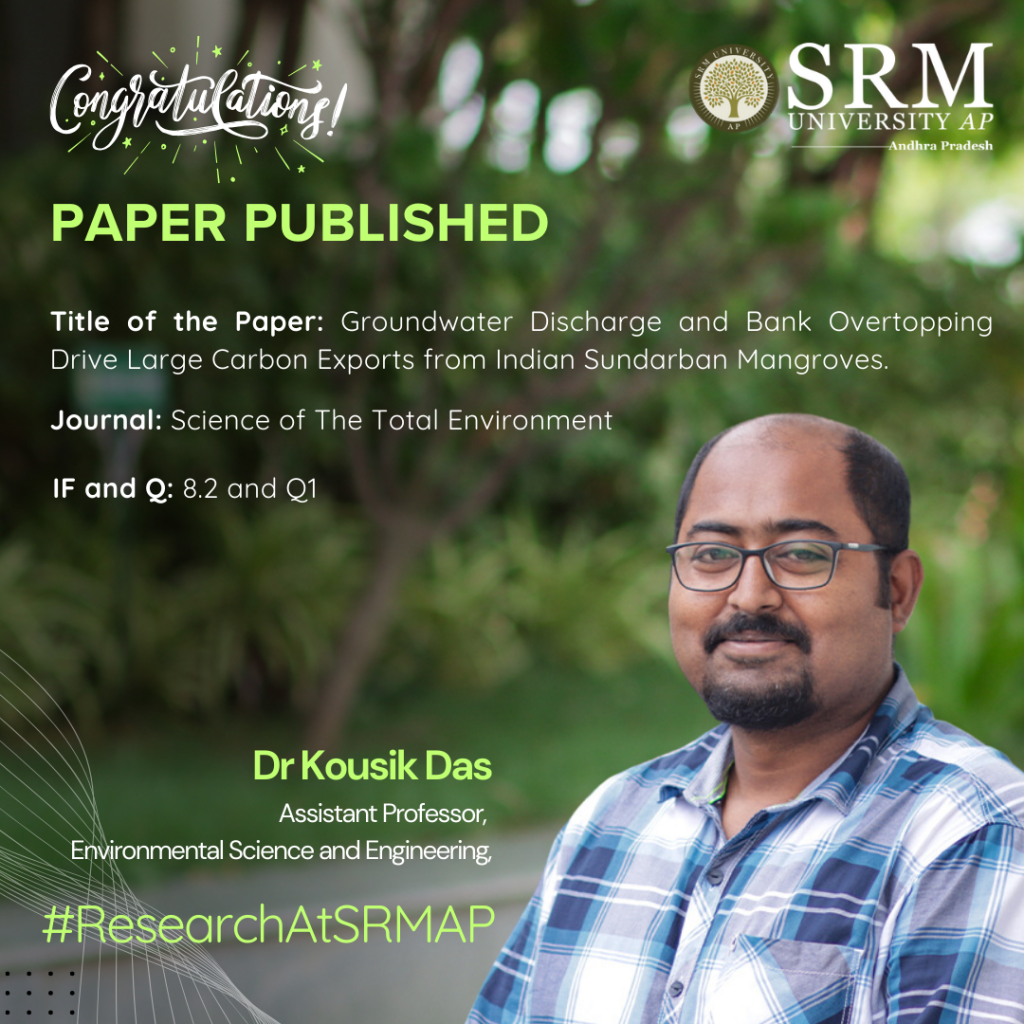
The Sundarbans represent the largest mangrove system on Earth, covering >10,000 km2. These mangroves can export a vast amount of aquatic carbon that can be potentially sequestered for millennia. Dr Kousik Das, Assistant Professor at the Department of Environmental Science and Engineering, collaborates with Southern Cross University, Australia and IIT Kharagpur to conduct breakthrough research to analyse and estimate the carbon flux between the Sunderbans and the Bay of Bengal. He has published a research paper titled “Groundwater discharge and bank overtopping drive large carbon exports from Indian Sundarban mangroves” in the Q1 journal Science of The Total Environment, having an impact factor of 8.2.
Abstract
We estimate porewater-driven carbon exchange between the Sundarbans and the Bay of Bengal using high-resolution time series and a radon groundwater mass balance approach spanning a neap-spring tidal cycle. Submarine groundwater discharge (SGD) increased from neap to spring tides by 352 % up to a maximum of 65.6 cm d−1 largely driven by creek bank overtopping after the mid-tide. Exports of dissolved organic and inorganic carbon and alkalinity doubled between neap and spring, likely due to the ‘first flush’ of older porewater in the mangrove flats. Groundwater discharge was a significant driver of the net carbon export, contributing up to 86.7 % of DIC and 74.0 % of alkalinity during the spring tide while contributing a lower proportion of DOC (4 %–23 %). If these results are representative of the Sundarbans more broadly, carbon fluxes from the Sundarbans would be more than an order of magnitude higher than some of the world’s largest rivers on an areal basis, highlighting the importance of Sundarbans mangroves to global oceanic carbon budgets.
Practical Implementation/Social Implications of the Research
This study shows the global importance of the Sundarbans mangrove system, with significant dissolved inorganic carbon and total alkalinity fluxes to the Bay of Bengal. It also shows that mangrove SGD is an important driver of dissolved inorganic carbon, dissolved inorganic carbon (DIC) and total alkalinity (TAlk) exports and that bank overtopping during mid and spring tides drives a ‘first flush’ of carbon from groundwater. When carbon fluxes from the study site were upscaled to the entire inundated area of the Sundarbans, DIC and TAlk exports were smaller than some of the world’s largest rivers, however when adjusted to the catchment size (assuming the Sundarbans mangrove catchment area is the extent of the mangroves; 10,200 km2), the areal carbon fluxes from the mangroves are more than an order of magnitude higher than these river systems
Dr Das aims to continue his research and further explore the large flux of carbon export due to tropical cyclones from the Indian Sundarbans to the Bay of Bengal.
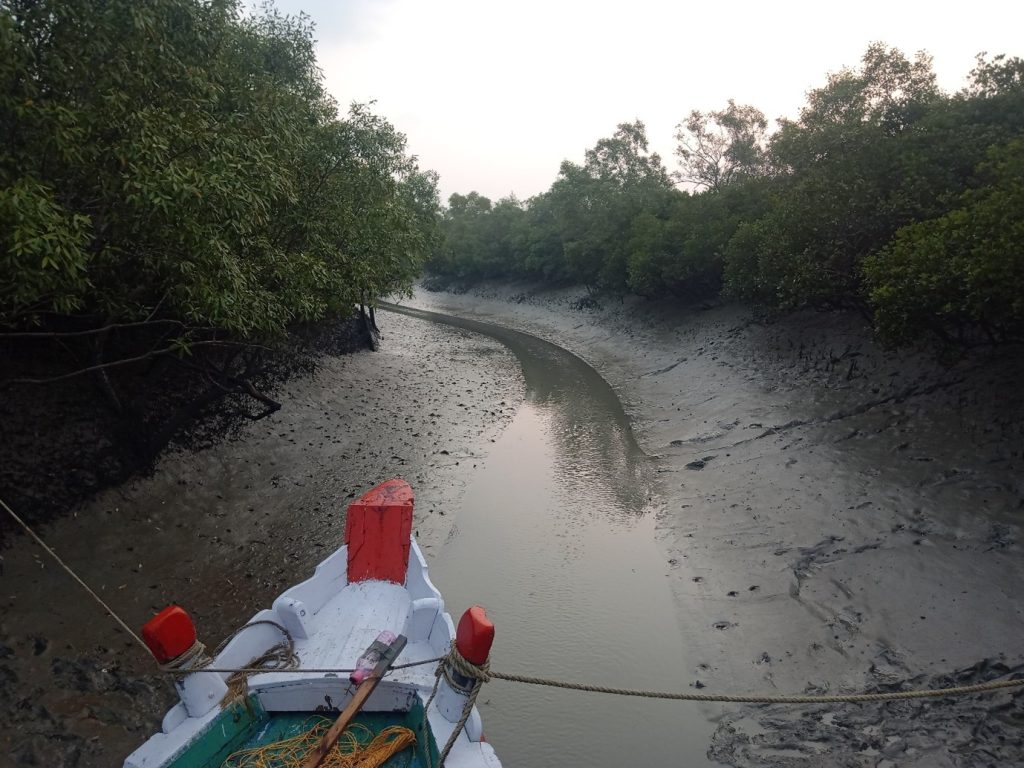
- Published in Departmental News, ENVS News, News, Research News
Industry Experts Inspire Future Leaders at the 2nd Success Mantra for Managers
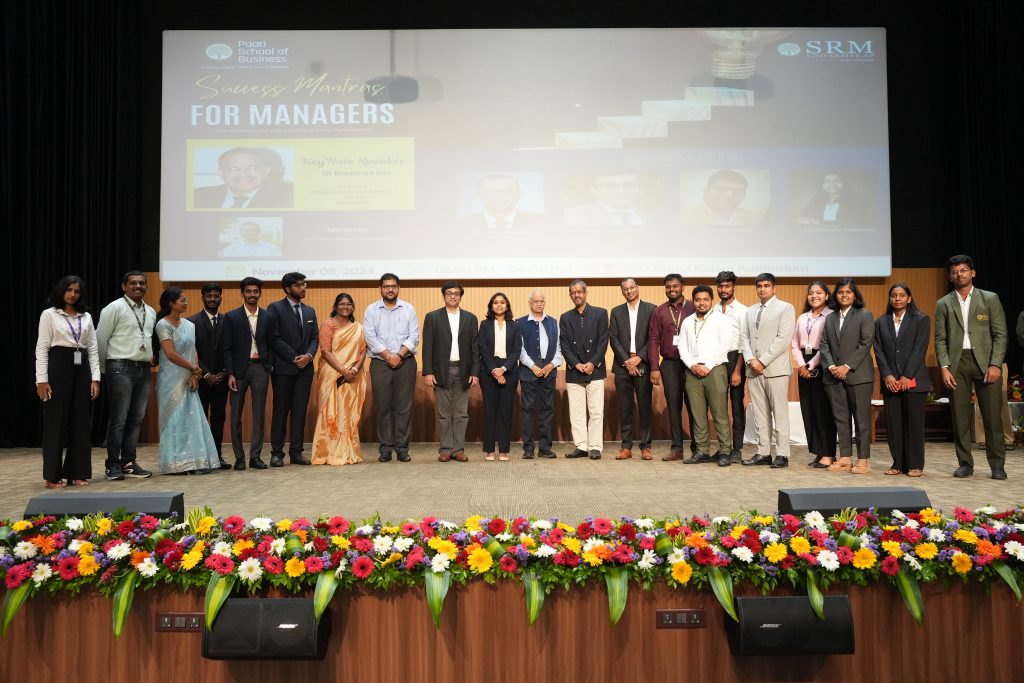
The Department of Management at the Paari School of Business conducted the second edition of its flagship event, “Success Mantra for Managers” (SMM), on November 08, 2024, uniting industry leaders to provide valuable insights, experiences, and professional guidance to students and faculty.
The event, moderated by Prof. Bharadwaj Sivakumar, Dean – Paari School of Business and Officiating Vice Chancellor, featured a distinguished panel that addressed the evolving landscape of management. Panellists shared their unique perspectives on effective leadership, motivation, and the importance of new-age skills in today’s corporate environment.
Ms Srimathi Sridharan, Director-BNY Mellon, remarked,” a manager’s role extends beyond mere target achievement; it fundamentally involves inspiring a team”. She highlighted the significance of kindness in leadership, drawing inspiration from her personal experience as well as the late industrialist and philanthropist, Mr Ratan Tata.
Mr Varun Gupta, Associate Director at PepsiCo, spoke passionately on the idea of Success. He stated, “Define Your Success, Yourself,” and stressed on the necessity for managers and leaders to possess a clear vision. He articulated how a well-defined personal and professional vision can guide managers in reaching their goals while empowering their teams.
Dr Bhujanga Rao, Chairman-KIMS Foundation & Research Centre and the key-note speaker for the discussion shared insightful reflections on his experience with Dr Abdul Kalam. He noted that compassion was a standout quality of Dr Kalam’s leadership, underlining that effective leadership encompasses understanding and supporting team members on both professional and personal levels.
Mr Suresh Ponnuru, Director-Analytics & Strategy Leader at Tiger Analytics, articulated the critical role of a leader in effectively communicating their team’s work to both superiors and clients. He highlighted the importance of perseverance and the ability to seize opportunities as they arise, which are essential traits for successful management.
Additionally, Mr Vinay Mantha, MD, Corporate & Investment Bank at J P Morgan Chase, conveyed that a manager should not only celebrate successes but also embrace failures as learning opportunities. This duality, he suggested, is fundamental to continuous growth and resilience in leadership.
In response to a question about handling success and failures at work, the panellists endorsed the significance of having an alternate plan—plan B if plan A fails. They collectively asserted that leaders must take responsibility for setbacks and implement corrective actions promptly.
The discussion further emphasised the need for managers to constantly evolve and acquire new skills, aligning with the event’s core theme that today’s managerial role must balance high performance with adaptability and empathy. Panellists shared personal anecdotes that underscored the joys and challenges of the profession.
The conversation delved into the relevance of emerging skills, such as artificial intelligence and the necessity for continuous learning, all deemed critical for future managers. Despite the focus on new-age competencies, the panellists unanimously vouched for the enduring value of traditional age-old skills like networking and ability to spot opportunities.
The event aimed at presenting the students with actionable insights and reinforced the vital importance of developing a versatile skill set in preparation for their careers, equipping them to thrive in a dynamic professional landscape.
- Published in Departmental News, News, Paari Current Happenings


